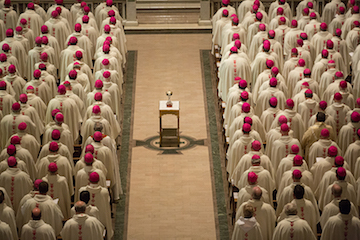A Pastoral Appeal by priests to the bishops of the world was published last week (see CuraPastoralis). The signers urgently request help in ending a false understanding of Christian life that has harmed the clergy and laity for fifty years. The remedy they seek is that bishops exercise their apostolic office through a formal reaffirmation of the Gospel, which refutes the long-standing errors. To that end, they profess the Faith in communion with the bishops and pope regarding ten particular aspects of the Gospel.
Much of the media coverage assumes that the Pastoral Appeal is directed against Pope Francis and Amoris Laetitia (AL). As one of the signers, I wish to note that such assessments fail to appreciate the purpose described in the Appeal and the accompanying Background Information. These documents actually invite us to consider the present crisis and the exercise of the apostolic office in a much broader context than is customary and which transcends the current pontificate.
The rationale in the Background states the Appeal is based on two observed facts and one pastoral judgment. The facts are: 1) the resurgence of a long-standing, harmful approach to Christian moral life, and 2) the failure of ecclesial attempts to end this approach. The pastoral judgment is that healing the damage will now require that bishops formally exercise their apostolic office.
The Background further notes that since the Church has already, clearly and precisely, refuted the errors that are spreading, an individual bishop can respond without having to engage in theological speculation. He can simply speak formally as a Successor of the Apostles, providing that unique apostolic witness by which Christ builds up the Church and overcomes error and sin through His truth and love.
Consequently, it is a mistake to interpret these observations and judgment as being focused on the present pontiff. After all, the recognition that a harmful approach to Christian life has continually afflicted the Church for fifty years also reflects on the pontificates of Blessed Paul VI, St. John Paul II, and Benedict XVI.
The Appeal asks for the full exercise of the apostolic office rather than joining in existing calls for clearer statements from Rome, episcopal conferences, and diocesan bishops or – more radically – for a new pope, because those means have already been tried and have proven insufficient. In the last fifty years, we have had five popes and innumerable pastoral statements at all levels without successfully confronting the crisis.
What we have not had is bishops refuting the errors through formal professions of faith in witness to Jesus and His Gospel. The Appeal urges bishops to exercise their apostolic office now, before the situation gets significantly worse. This request is rooted in the Lord’s mandate to the apostles which, exercised in a formal act by their successors, serves to gather and heal the Church.
Those who interpret the Appeal differently in this regard need to reconsider the actual language of the documents. They might also consult Lumen Gentium 23-25 on the teaching office of individual bishops within the universal Church.

In addition to these observations, based solely on the Appeal, I would like to add some personal considerations that I believe expose the underlying weakness of the notion that Pope Francis or AL is the problem.
If Pope Francis were the problem, then a new pope would be the solution. Yet will the process that elects the next pope result in someone substantially different? Would the bishops advocating alterations of Church teaching and practice suddenly change their minds? Would the next pope be able to accomplish what Paul VI, John Paul II, and Benedict XVI proved unable to do in fifty years of teaching and governing?
As for AL, ambiguities in the text could not be the source of harmful teachings and practices. The worst that ambiguities can do is provide space for promoting errors. But where did those errors and their promoters come from? They must have been present and operating in the Church prior to AL.
Clearly, the problem predates Pope Francis and AL. The question, then, is how theologians and prelates wishing to alter the faith and moral life of the Church have been able to mount a campaign for decades without an effective response from the rest of the College of Bishops. The revisionists have prospered because they have chosen effective means to their goal. The rest of the College has evidently been uncertain of the goal or unable to find a way to achieve it.
Perhaps, like many Catholics, bishops have thought the only proper and effective response to such problems is “Wait for the pope to handle it.” This is a debilitating side effect of ultramontanism, a distorted notion of the papacy that in effect makes the pope the reference point for the whole of Christian life and the “boss” of the bishops. In truth, Jesus is the reference point and He entrusted the proclamation of the Gospel and care of the Church to the Apostles and their successors, not only to Peter and the popes.
Waiting for popes or fellow bishops to act does not always lead individual bishops to offer a faithful witness to Christ. Remember the hierarchy under the Renaissance popes and the English bishops under Henry VIII.
As long as the false approach to Christian life persists, our common witness to Jesus is at risk. In this crisis, the revisionists are happy to see bishops waiting for the pope or for a consensus to emerge – or even issuing oppositional pastoral letters and diocesan policies. This suits them fine because it allows their initiatives to flourish and, besides, it has proven insufficient for fifty years.
Apostolic proclamation is required, since only then are Jesus’ words “who hears you, hears me” fully realized. Then the voice of the Good Shepherd resounds within the Church to form the conscience of his people. The Pastoral Appeal is asking to hear His voice through formal expressions of apostolic witness by the bishops.
















